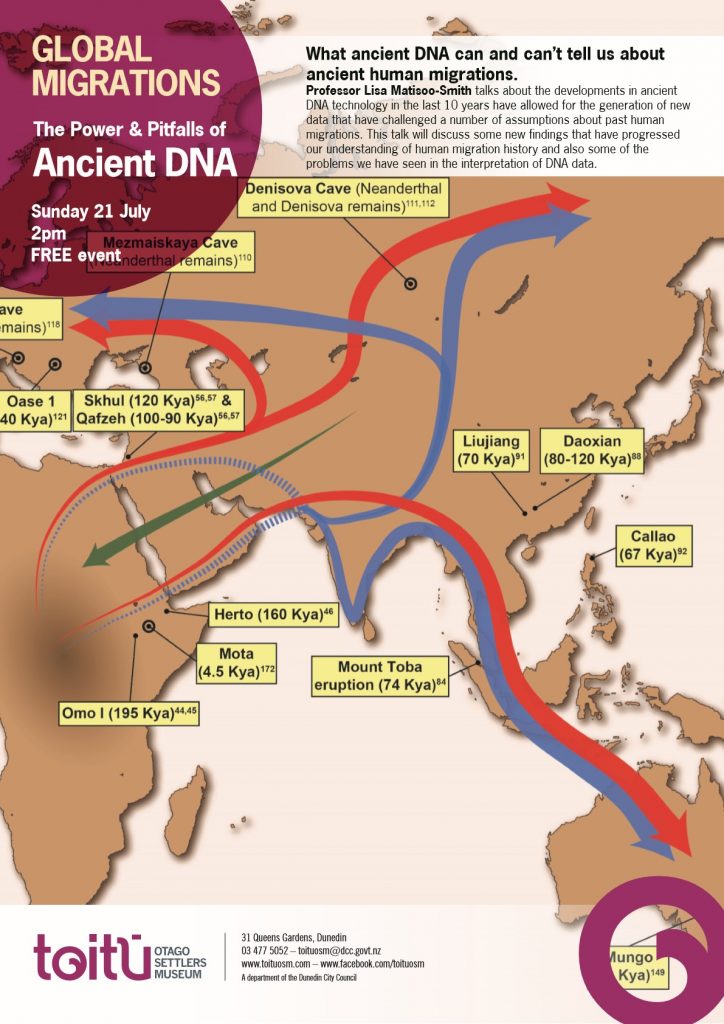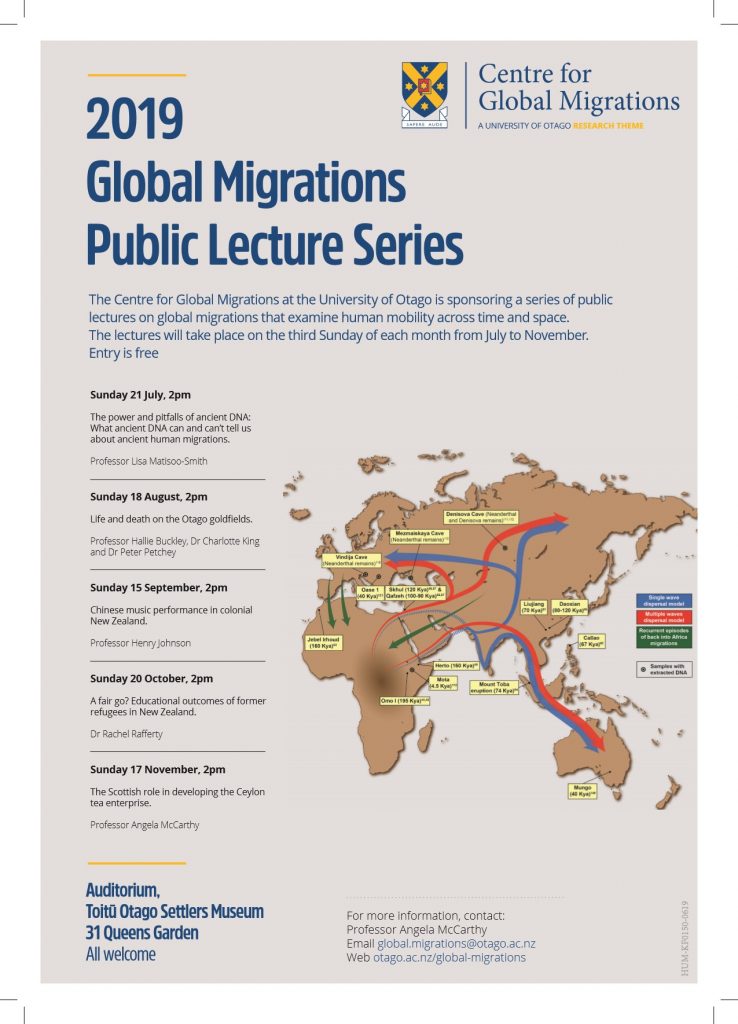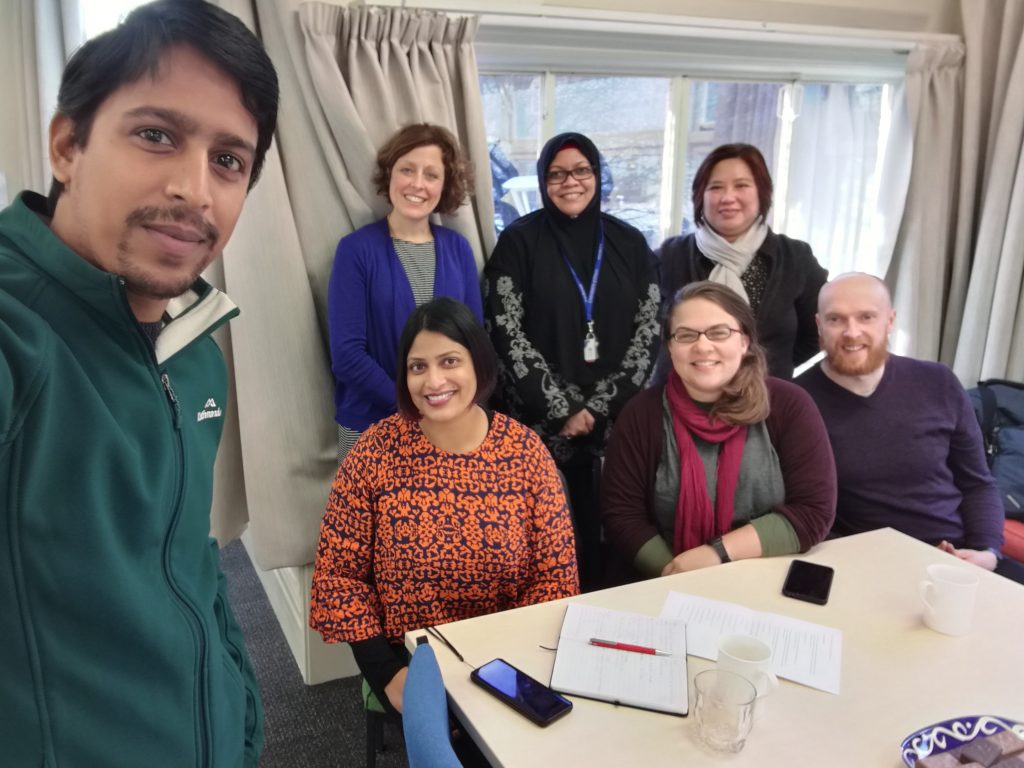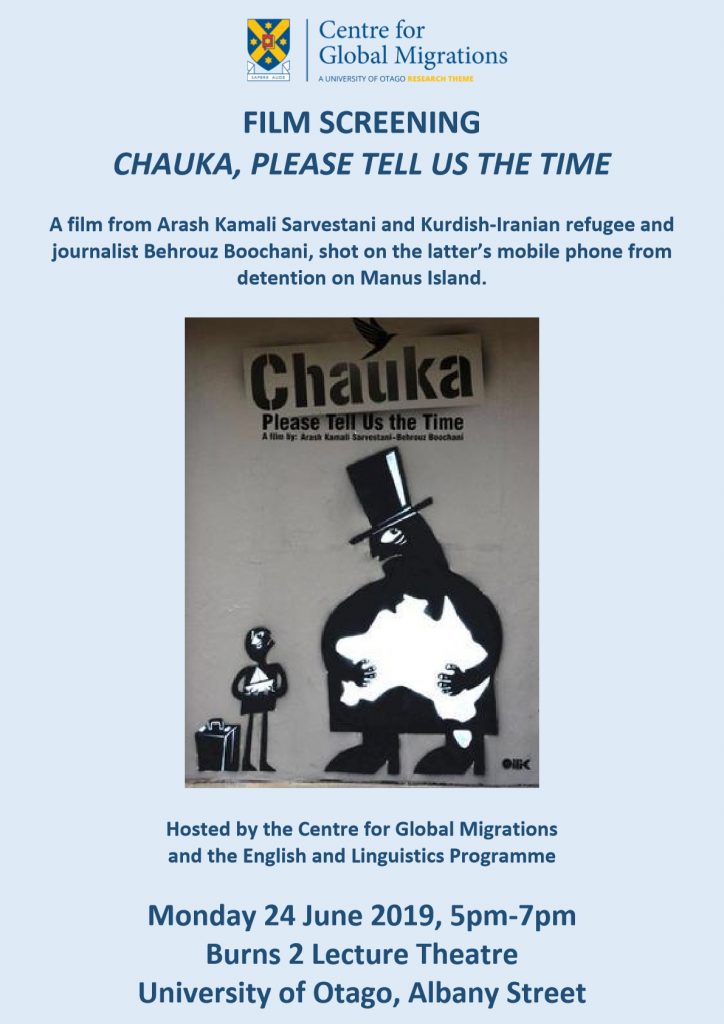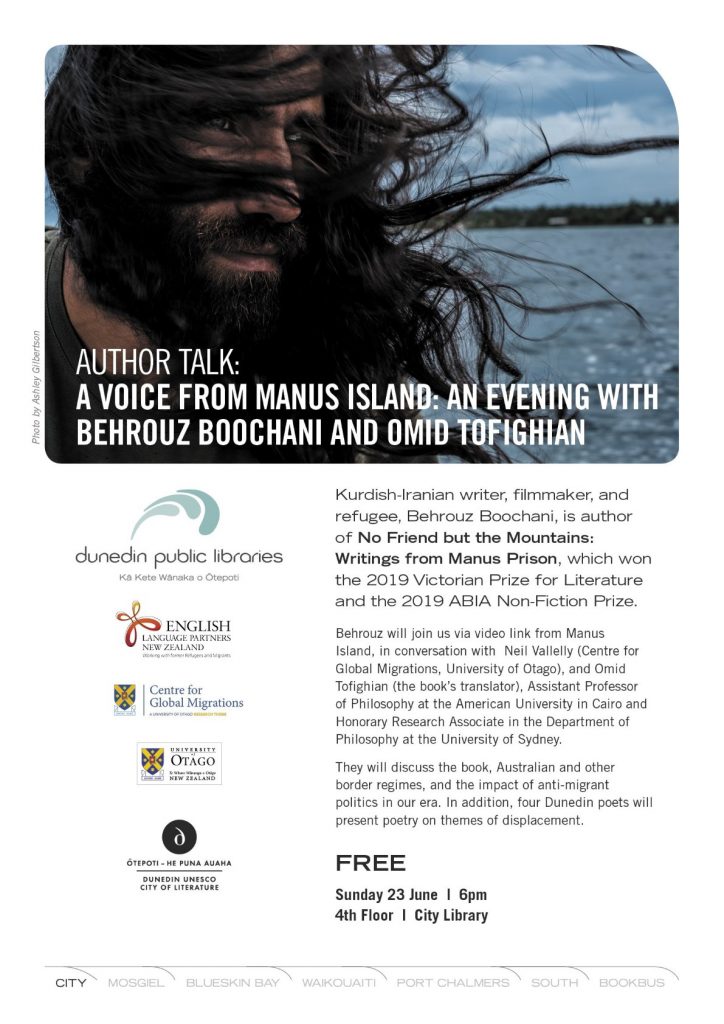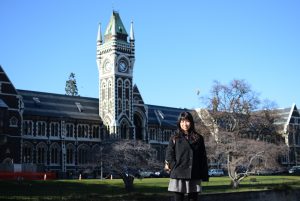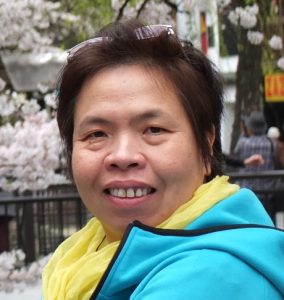Global Migrations 2019 Public Lecture Series Talk 1: Ancient DNA and Human Migration
Free Public Lecture
‘The Power and Pitfalls of Ancient DNA: What ancient DNA can and can’t tell us about ancient human migrations’
Professor Lisa Matisoo-Smith
University of Otago
Sunday 21 July 2019, 2pm
Toitū Otago Settlers Museum
Please join us for the first talk in our 2019 Global Migrations Public Lecture Series when Professor Lisa Matisoo-Smith discusses ancient DNA and human migration.
The developments in ancient DNA technology in the last 10 years have allowed for the generation of new data that have challenged a number of assumptions about past human migrations. Many high profile publications have resulted, yet we have also seen cases where initial interpretations have been shown to be problematic. This talk will discuss some of the new findings that have progressed our understanding of human migration history and also some of the problems we have seen in the interpretation of aDNA data which highlight the need for better engagement and integration across disciplines.
Global Migrations public lecture series 2019
We are delighted to announce details of our 2019 Global Migrations public lecture series. Our talks take place at 2pm on the third Sunday of every month between July and November 2019 at Toitū Otago Settlers Museum.
Meeting Labour MP Priyanca Radhakrishnan
On Monday 24 June 2019, members of the Global Migrations group were delighted to meet with Labour List MP Priyanca Radhakrishnan, who is based in Maungakiekie, Auckland. The team chatted informally with Priyanca whose background is well-aligned with the work of the Centre. She is a former international student and worked with migrant peoples prior to becoming an MP, after completing a Masters at Victoria University of Wellington.
At the end of the discussion, Priyanca asked what members of the Global Migrations group would like to see happen if we were in government. This was an amazing opportunity to share our wishlists.
We greatly appreciated Priyanca’s genuine interest in our research and perspectives on policy. As our co-director Dr Vivienne Anderson commented, ‘I personally found it heartening to find someone in government is so interested in input from researchers.’
Film Screening: Chauka, Please Tell us the Time
On Monday 24 June 2019, we were pleased to be able to screen Chauka, Please Tell Us the Time. The film, from Arash Kamali Sarvestani and Kurdish-Iranian refugee and journalist Behrouz Boochani, was shot on the Boochani’s mobile phone from detention on Manus Island.
The event was hosted by the Centre for Global Migrations and the English and Linguistics Programme.
A Voice from Manus Island: An Evening with Behrouz Boochani and Omid Tofighian
Free Public Lecture
Sunday 23 June 2019, 6pm-7.30pm
Dunningham Suite, Floor 4, Dunedin City Library
On Sunday 23 June we co-hosted an evening with Kurdish-Iranian writer, filmmaker, and refugee Behrouz Boochani, who is currently incarcerated by the Australian government in the Manus Island Regional Processing Centre (Papua New Guinea). Boochani is author of No Friend but the Mountains: Writings from Manus Prison, which won the 2019 Victorian Prize of Literature at the NSW Premier’s Literary Awards, and the 2019 Australian Book Industry Awards (ABIA) General Non-Fiction Book of the Year. Behrouz joined us via video link from Manus Island for the event. We were also joined in person by Omid Tofighian, translator of No Friend but the Mountains, and Assistant Professor of Philosophy at the American University in Cairo and Honorary Research Associate in the Department of Philosophy at the University of Sydney.
Boochani and Tofighian were in conversation with Dr Neil Vallelly (Centre for Global Migrations, University of Otago) discussing the book, Australian and other border regimes, and the impact of anti-migrant politics in our era. Three Dunedin poets presented poetry on themes of displacement.
A press release with commentary from Dr Neil Vallelly is available here.
You can read a media interview with Boochani here.
A recording of the event is on You Tube here.
This event was presented in association with English Language Partners, UNESCO City of Literature, Dunedin Public Libraries, and the Centre for Global Migrations and the Programme of English and Linguistics at the University of Otago.
Our member Naoko Inoue passes her PhD examination
Congratulations to our postgraduate member Naoko Inoue who has passed the examination for her PhD titled ‘The experiences of native English speaking academics who work and live in Japan’.
Naoko situated her study in relation to internationalisation policy in Japanese higher education. Data were collected through interviews with native English speaking academics, and discourse analysis of official (government and institutional) internationalisation documents.
The study revealed how internationalisation discourses in Japan value native English speakers’ English language skills, ‘nativeness’ and, in some cases, whiteness. These discourses were both reflected and contested in native English speaking academics’ accounts of living and working in Japan. Participants recognised that they benefited from a ‘native English speaker’ identity, but they also sought to identify themselves otherwise – as ‘competent academics’ rather than ‘native English speakers’.
Dr Vivienne Anderson, Naoko’s supervisor, said, ‘I am excited that Naoko has finished the thesis, and look forward to seeing her graduate in May. Naoko’s work is important in that it complicates existing literature on the dominance of the English language in internationalisation policy and practice.’
Naoko is very happy to have completed her PhD and noted, ‘I am grateful to my supervisors, HEDC, the Univeristy of Otago and the Centre for Global Migrations for their support.’
Migration, Health and Wellbeing conference, November 2019
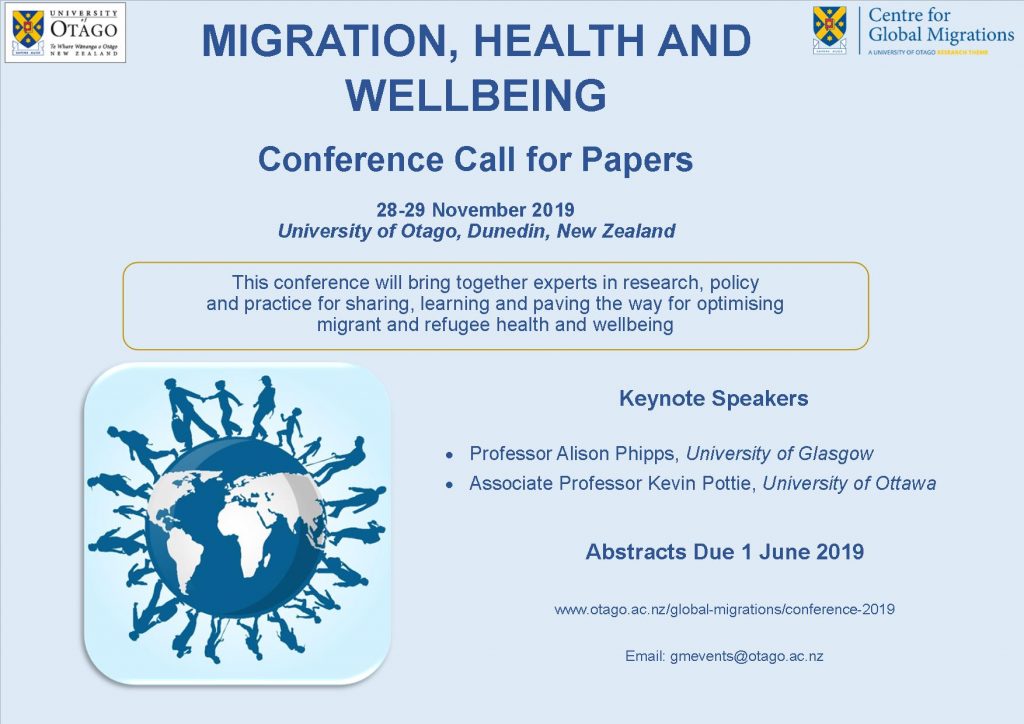 This two-day conference aims to bring together experts in research, policy and practice for sharing, learning and paving the way for optimising migrant health and wellbeing. The conference will adhere to a social determinants of health framework which acknowledges the multifaceted factors influencing the health and wellbeing of migrants in their host countries.
This two-day conference aims to bring together experts in research, policy and practice for sharing, learning and paving the way for optimising migrant health and wellbeing. The conference will adhere to a social determinants of health framework which acknowledges the multifaceted factors influencing the health and wellbeing of migrants in their host countries.
We welcome presentations that consider any aspect of migration, health and wellbeing across time and space. All submissions are welcome, including from post-graduate students.
Please provide the following details to Lea Doughty (email: gmevents@otago.ac.nz) before the deadline of 1 June 2019:
- Paper title
- Abstract (200 words maximum)
- Brief biographical information (including institutional affiliation and contact details)
Regrettably, we are unable to provide funding support for participants.
Keynote Speakers:
- Professor Alison Phipps, OBE, University of Glasgow
- Associate Professor Kevin Pottie, Ottawa University
Please see our website for further details: www.otago.ac.nz/global-migrations/conference-2019
2019/20 Visiting Lecturer: Professor Maria Reinaruth Carlos
We are delighted to announce that our 2019/2020 Visiting Scholar will be Professor Maria Reinaruth D. Carlos, Professor of Economics in the Faculty of International Studies, Ryukoku University, Kyoto, Japan. Professor Carlos will work with our member Dr Arlene Ozanne to advance their research on overseas-educated nurses working in the elderly care sector in New Zealand and Japan. Part of their research will offer policy ideas to Japan, the world’s most aged country, in its search for long-term solutions to this problem.
During her visit to Dunedin in early 2020, Professor Carlos will give a public lecture examining the links between skills and labour migration patterns and a workshop on overseas-educated nurses in New Zealand’s elderly care sector.
Public talk during Race Relations Week: Migration and Mobility in the Data Age
Free Public Lecture
‘Migration and Mobility in the Data Age: What are the consequences for race and health?’
Dr Ruth De Souza
University of Melbourne
Wednesday 20 March 2019, 12.30pm
Room 118/119, Hunter Centre, 279-281 Great King Street, Dunedin
Information technologies gather and process data on almost every human activity at unprecedented speed and volume, with potential for both timely and novel insights into complex social issues. At the same time, there is growing evidence of inequalities across applications of big data with discriminatory impacts.
In this public lecture during Race Relations Week 2019, Dr Ruth De Souza will explore how data is reshaping migration policies globally, particularly in relation to concerns about terrorism, race and irregular migration and how this transforms understandings of migrant and refugee health and wellbeing.
Dr Ruth De Souza is the Academic Convenor of the Data, Systems and Society Research Network (DSSRN), and Honorary Senior Research Fellow in Clinical Informatics and Population Health Informatics at the University of Melbourne. A Fellow of the Royal College of Nursing, Ruth is particularly concerned with health inequities among refugee, migrant and indigenous communities.
Research funding on Chinese music in New Zealand
Our Associate Director Professor Henry Johnson, from the Department of Music, Theatre & Performing Arts at the University of Otago, has recently been awarded an external research grant of US$45,000 from the Chiang Ching-kuo Foundation for International Scholarly Exchange for a three-year project entitled ‘Chinese Creative Musical Practices in the Making of New Zealand from the Mid-Nineteenth Century to the 1980s’. This prestigious international award is for innovative research that will study creative musical practices that have often been hidden from mainstream society, especially when compared with other regions of the world, and will help redefine the cultural heritage of Aotearoa New Zealand.
Early reports of cultural creativity through music making are found mostly in local newspapers, and while these will form a foundation for historical content analysis, the research will offer a rigorous community-engaged and ethically aware approach in its study of written sources, musical instruments, ritual objects, unpublished archival documents, pictures, photographs, film, museum artefacts, community organizations and oral history. This original project theorises that creative musical practices amongst migrant communities are a reflection of both homeland and adopted home. This premise will help reveal internal modification amongst Chinese communities and the dynamic negotiation with the non-Chinese population where cultural difference was often conspicuous, inequitable and challenging. A comprehension of such practices helps contextualize the making of multiculturalism in New Zealand in colonial and postcolonial context.
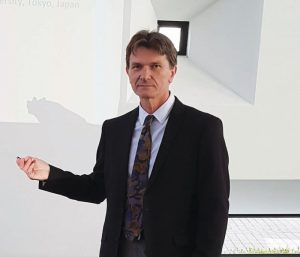 This research will advance knowledge by producing outputs with significant long-term impact that will contribute to a comprehension of cultural creativity in the making of a nation. The major scholarly outputs for this project will be top-tier refereed journal articles and research presentations, which will uncover and redefine the hidden tangible and intangible creative Chinese cultural heritages that have helped shape New Zealand.
This research will advance knowledge by producing outputs with significant long-term impact that will contribute to a comprehension of cultural creativity in the making of a nation. The major scholarly outputs for this project will be top-tier refereed journal articles and research presentations, which will uncover and redefine the hidden tangible and intangible creative Chinese cultural heritages that have helped shape New Zealand.
Congratulations Henry!

